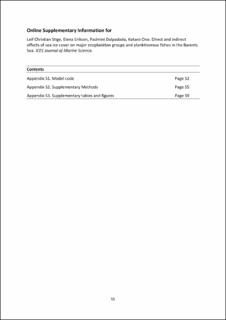Direct and indirect effects of sea ice cover on major zooplankton groups and planktivorous fishes in the Barents Sea
Peer reviewed, Journal article
Accepted version

Date
2019Metadata
Show full item recordCollections
- Articles [3012]
- Publikasjoner fra CRIStin [3066]
Abstract
Reductions in Arctic sea ice affect marine food webs through a multitude of direct and indirect effects. We here analysed direct, indirect, and delayed associations between winter sea ice cover and year-to-year changes in biomasses of the main zooplankton groups (copepods, krill, amphipods) and planktivorous fishes (capelin, polar cod) in the central and northern Barents Sea from 1980 to 2015. Climate effects and species interactions were estimated jointly in a Bayesian state-space model framework. We found that population biomass of capelin increased in years with low sea ice cover, while biomasses of copepods and amphipods decreased. Furthermore, results suggested strong bottom-up effects by krill on capelin and by copepods on amphipods and top-down effects by polar cod on amphipods and by capelin on krill and copepods. Sea ice effects thereby cascaded through the food web through indirect and delayed effects. The indirect and delayed effects amplified the effects of sea ice cover on capelin, copepods and amphipods. For krill, low sea ice cover most likely increased biomass in the short-term but reduced biomass in longer terms because of increased predation pressure. These findings suggest that both bottom-up and top-down processes need to be considered when projecting effects of future climate change on ecosystems.